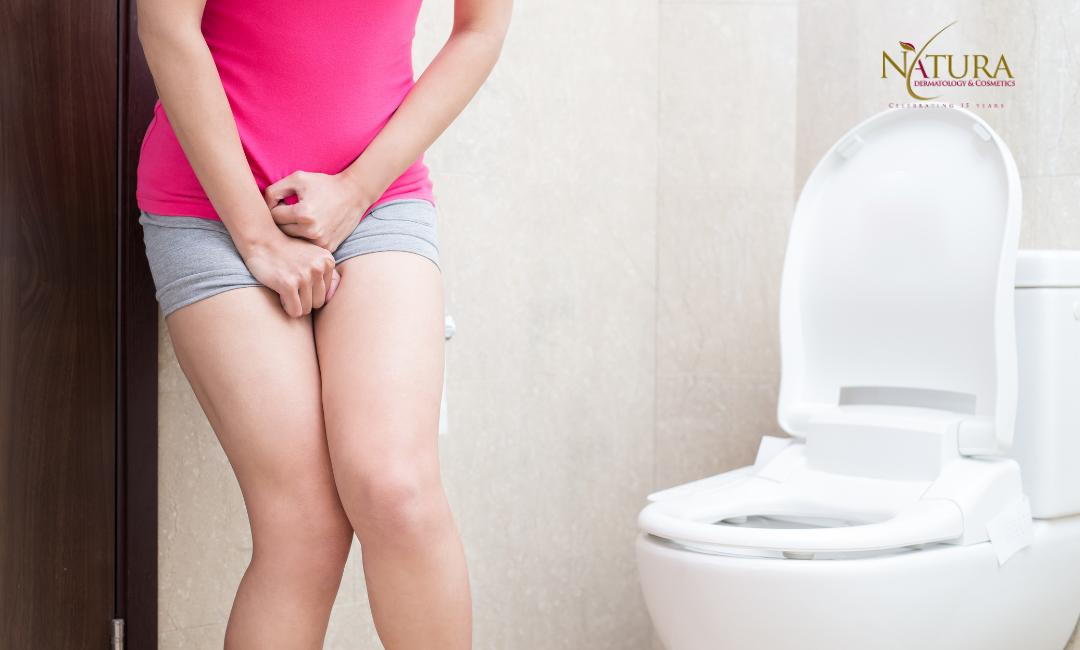Can a UTI Cause Incontinence

- posted: Aug. 06, 2024
Have you ever felt that sudden urge to pee, only to have a little leak before you make it to the bathroom? If you're dealing with a urinary tract infection (UTI), you might be wondering if there's a connection. Could that pesky UTI be the culprit behind your unexpected stress incontinence?
We're here to spill the tea on UTIs and incontinence, separating fact from fiction. In this post, we'll cover:
The surprising link between UTIs and bladder control
Why UTIs can sometimes cause those embarrassing urine leakage
When it's time to call in the experts at Natura Dermatology & Cosmetics
If you're ready to ditch the worry and get back to feeling confident, read on. We've got your back.
P.S. Dr. Richardson and Blair at Natura Dermatology & Cosmetics are experts in treating urinary incontinence. They're dedicated to helping you regain control and feel your best.
The Link Between UTIs and Bladder Control

You might be surprised to learn that UTIs and bladder control issues are often BFFs (best friends forever, in case you were wondering). It's not just about the burning sensation and frequent bathroom trips; UTIs can actually cause temporary mixed incontinence.
So, how does this happen?
Think of your bladder as a balloon. When a UTI strikes, it's like someone's poking and prodding that balloon, making it irritated and jumpy.
These bladder irritants can trigger those sudden, can't-hold-it-in urges to pee, and sometimes, you might not make it in time.
But here's the silver lining:
UTI-related incontinence is usually short-lived. Once the infection clears up, your bladder control should return to normal. Of course, every case is different.
When to seek help:
If your overflow incontinence persists after your UTI is gone
If you're experiencing other unusual symptoms
If you're just plain worried (hey, we've all been there)
Remember that the experts at Natura Dermatology & Cosmetics are always here to help. Don't hesitate to contact us if you have any concerns.
Why UTIs Can Sometimes Cause Those Embarrassing Leaks
Okay, let's get to the details of why UTIs can lead to those unexpected leaks. It all boils down to a few key factors:
Inflammation and Irritation: When bacteria invade your urinary tract, your body's natural defense system kicks in. This leads to inflammation in the bladder lining – think of it like your bladder getting a sunburn. This inflammation can make your bladder extra sensitive and trigger those sudden, gotta-go-now urges.
Muscle Spasms: UTIs can also cause your bladder muscle to go into spasm mode. These spasms can be unpredictable and lead to those oh-so-fun leaks. It's like your bladder is playing a game of tug-of-war with itself, and you're caught in the middle.
Nerve Signals Gone Haywire: Your bladder and your brain are constantly communicating through nerve signals. But a UTI can throw a wrench in this communication system. The infection can cause mixed signals, leading to those "false alarms" when your bladder isn't actually full.
Overactive Bladder (OAB): Sometimes, a UTI can trigger or worsen a condition called overactive bladder (OAB). OAB is like having a bladder with a mind of its own – it's constantly sending out those gotta-go signals, even when it's not really full.
The Good News: Treatment Works
The good news is that UTIs are treatable. Once the infection is cleared up, the inflammation, spasms, and nerve signal chaos should settle down, and your bladder control should return to normal.
If you're prone to UTIs or have underlying bladder issues, you might need some extra help. That's where Natura Dermatology & Cosmetics comes in. Our team of experts can create a personalized treatment plan to address the root cause of your incontinence and help you regain control.
When It's Time to Call in the Experts at Natura Dermatology & Cosmetics
Alright, so you've got a UTI, and you're dealing with some leakage. When should you start to worry? Here's the lowdown:
Incontinence After the UTI Clears Up: If you're still experiencing leaks even after your UTI is gone, it's time to pick up the phone. This could be a sign of an underlying bladder issue that needs a closer look.
Severe or Persistent Symptoms: We're talking about leaks that are seriously interfering with your life, or pain that just won't quit. Don't suffer in silence – reach out for help.
You're Just Plain Worried: Hey, we get it. Bladder control problems can be stressful and embarrassing. If you're feeling anxious or unsure, the experts at Natura Dermatology & Cosmetics are here to listen and offer guidance.
What to Expect at Natura Dermatology & Cosmetics
Our team of experienced professionals understands the frustration and embarrassment that bladder problems can cause. We'll take the time to listen to your concerns, answer your questions, and develop a personalized treatment plan that's right for you.
Here's a sneak peek at what we can offer:
Comprehensive Evaluation: We'll get to the root of the problem with a thorough assessment of your bladder health.
Personalized Treatment Plans: We offer a range of cutting-edge treatment options, from lifestyle changes and medication to innovative procedures like Emsella.
Compassionate Care: We're here to support you every step of the way, with a focus on helping you regain confidence and control.
Don't let bladder problems hold you back. Contact Natura Dermatology & Cosmetics today and take the first step towards a happier, healthier you.
Can Urinary Incontinence Be Reversed?
The million-dollar question: can you really get rid of incontinence for good? The answer is that it depends. Incontinence isn't a disease but a symptom of an underlying issue. So, the reversibility of incontinence depends on what's causing it in the first place.
Reversible Causes of Incontinence
UTIs: As discussed, UTI-related incontinence is usually temporary and goes away once the infection is treated.
Medication Side Effects: Some medications can mess with your bladder control. If your incontinence started after starting a new medication, talk to your doctor. Switching meds or adjusting the dosage might do the trick.
Constipation: Believe it or not, that backed-up poop can put pressure on your bladder and trigger leaks. Getting things moving again can often improve incontinence.
Overactive Bladder (OAB): While OAB is a chronic condition, it can be managed effectively with lifestyle changes, medication, and therapies like those offered at Natura Dermatology & Cosmetics.
When Incontinence Might Be Harder to Reverse
Nerve Damage: Conditions like multiple sclerosis or spinal cord injuries can damage the nerves that control your bladder, making incontinence more difficult to treat.
Pelvic Organ Prolapse: This occurs when your pelvic organs (like your bladder or uterus) drop down into the vagina. While surgery can sometimes correct the prolapse, incontinence might not be fully reversible.
Certain Medical Conditions: Conditions like diabetes or Parkinson's disease can also contribute to incontinence. While these conditions can't be cured, managing them can often improve bladder control.
Even if your incontinence isn't completely reversible, there are always things you can do to manage it and improve your quality of life. From pelvic floor exercises and bladder training to medications and cutting-edge therapies like Emsella, there are options out there for you.
FAQs
What type of incontinence is caused by UTI?
UTIs most commonly trigger urge incontinence. Imagine you're going about your day, and suddenly, BAM. An intense urge to urinate hits you like a freight train. That's urge incontinence, and UTIs are notorious for causing it. The infection irritates your bladder, making it feel like it needs to empty even when it's not full.
How do you stop urinary incontinence from UTI?
The most effective way to tackle UTI-related incontinence of the female urinary system is to nip the infection in the bud. Antibiotics are your trusty sidekick here. Once the infection clears up, your bladder should calm down and regain control.
While you're waiting for those antibiotics to work their magic, try incorporating pelvic floor exercises (like Kegels) into your daily routine. These exercises strengthen the muscles that support your bladder, helping to improve control.
Is incontinence a symptom of kidney infection?
While not the most common symptom, kidney infections can sometimes throw incontinence into the mix. This is because the infection can spread from your kidneys to your bladder, causing irritation and urgent bathroom trips. So, if you're experiencing incontinence alongside other symptoms like back pain, fever, or nausea, it's definitely worth getting checked out by a doctor.
What are the symptoms of a serious bladder infection?
A serious bladder infection isn't messing around. It can bring on a whole host of unpleasant symptoms, including:
High fever that just won't quit
Chills that make you shiver
Back or side pain that feels like a constant ache
Nausea and vomiting that leave you feeling drained
Bloody or cloudy urine that's definitely not normal
If you experience any of these red flags, don't hesitate to seek medical attention before it reaches the condition of an enlarged prostate or benign prostatic hyperplasia (BPH). A serious bladder infection can quickly escalate, so prompt treatment is key.
Ready to Take Back Control?
Don't forget the fact that those pesky urine leaks are often temporary and treatable. But if you're worried or experiencing persistent problems, don't hesitate to reach out for help.
Key takeaways:
UTIs can trigger temporary functional incontinence.
The culprit is usually urge incontinence.
Treatment for UTI often resolves the issue.
Persistent incontinence warrants a visit to the doctor.
At Natura Dermatology & Cosmetics, we understand that bladder problems can be a real downer. But hey, you don't have to let them rule your life. Our team of experts is here to help you regain control and confidence.
Don't let leaks hold you back. Contact us today, and let's get your bladder back on track.
Contact Us
Our Locations
Broward Location
800 E Broward Blvd, Ste 507
Fort Lauderdale, FL, USA
Hours of Operation
8:30 am - 12:00 pm
1:30 pm - 5:00 pm
8:30 am - 12:00 pm
1:30 pm - 5:00 pm
8:30 am - 12:00 pm
1:30 pm - 5:00 pm
8:30 am - 12:00 pm
1:30 pm - 5:00 pm
8:30 am - 12:00 pm
1:30 pm - 5:00 pm
Closed
Closed


